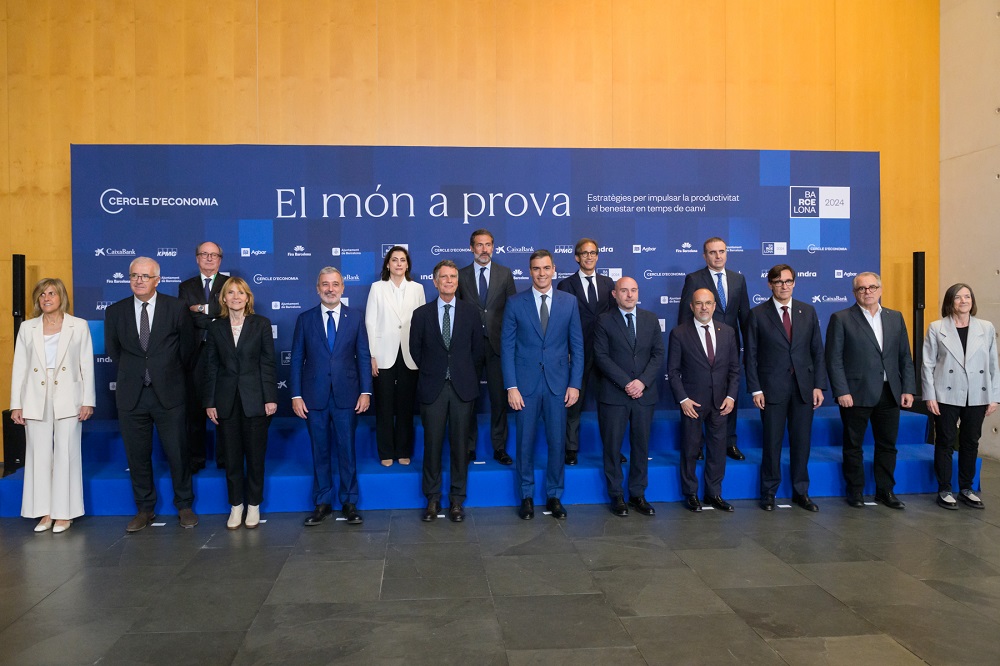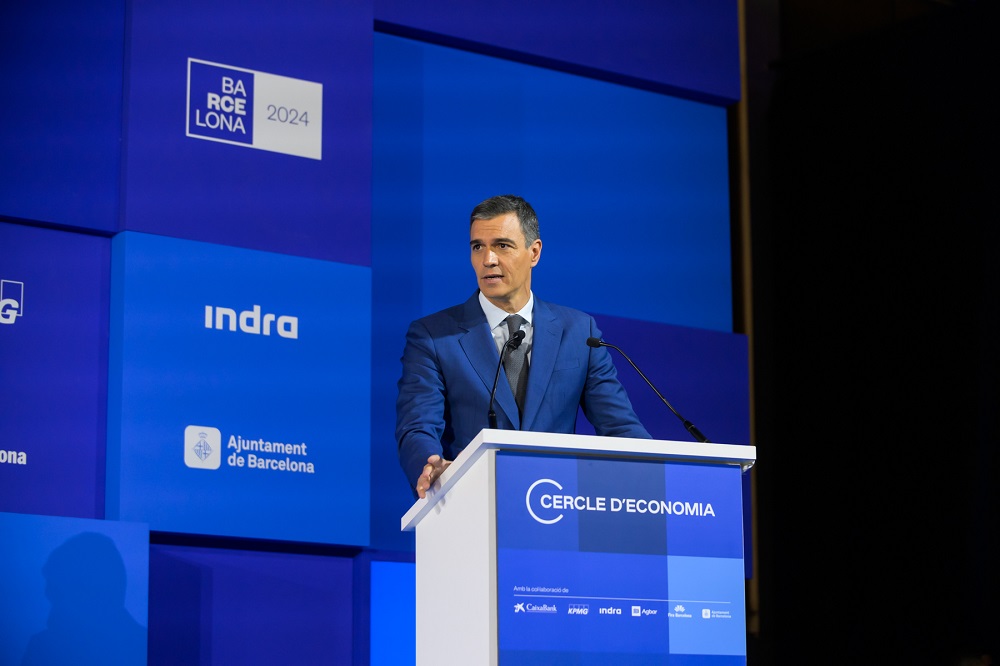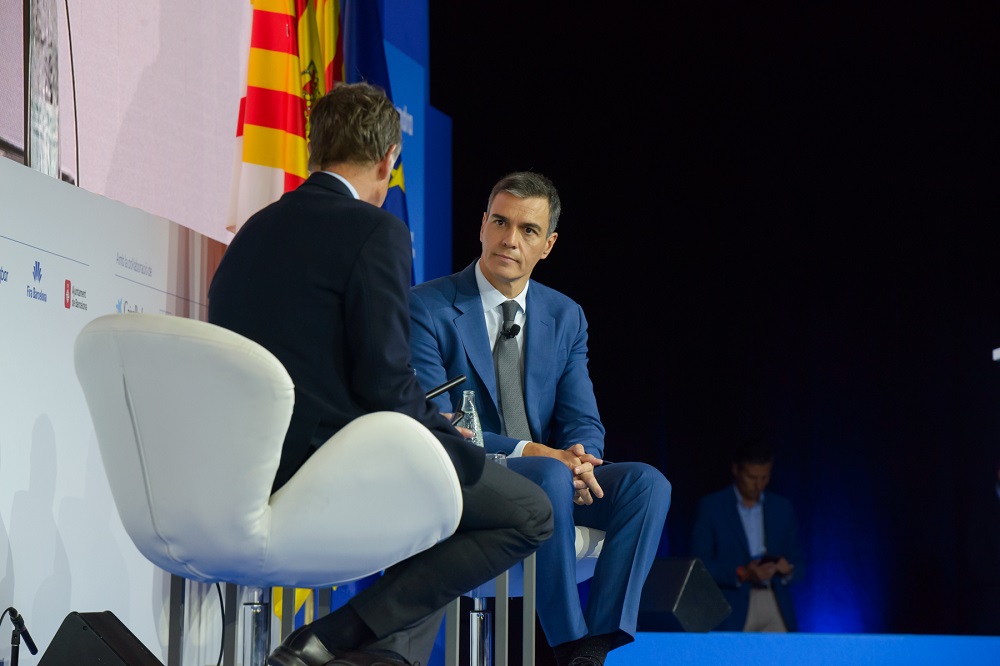After congratulating the President of the Government of Spain, Pedro Sánchez, for the results obtained by PSC in the 12-M elections in Catalonia, Jaume Guardiola, president of Cercle d'Economia, reflected that "investing a government (in Catalonia) and getting it to have a minimum of stability will not be easy, but it should not be impossible" and called for "transversality and pact" to avoid the deadlock and a repetition of the elections that "it would have a very high political and economic cost". He recognised Pedro Sánchez for his "courage when it comes to making decisions" and linked the "institutional normalisation" recovered by Catalonia in recent years with his government action. "We believe that amnesty is an opportunity to close a sterile period and to open a stage within the constitutional framework in which it is possible to address issues related to self-government," he said.

He emphasised the pending reform of the regional financing system – "it is urgent and must be profound" – with a new model that "must fall on the capacity of the autonomous communities to design a tax policy that gives them sufficient financial capacity and in which they are co-responsible for their income and expenditure". And that "ensures a minimum level of solidarity," he said. In his presentation he also referred to the "polarisation" of Spanish political life with a direct interpellation to the speaker: "The sustained implementation of an ambitious reform programme requires the reconstruction of a space for dialogue and negotiation that the President of the Government must lead", hand in hand with "businessmen, trade unions and civil society".

In economy, Guardiola regretted the "poor evolution of productivity that grows below the European average". A trend that, "if it persists, leads us to the mediocrity of the less productive economies of the European Union".
Catalonia, the Spanish economic evolution and, also, the future of the European project, delimited the field of argument of the President of the Government of Spain, Pedro Sánchez. As for Catalonia, he highlighted "the improvement of the political and social climate" and highlighted the role of the Cercle d'Economia: "Your sense of responsibility has played a fundamental role in overcoming one of the greatest political crises, but also of economic and social coexistence, experienced in Catalonia and in the country as a whole for too many years". He shared with Guardiola the idea that the result of the Catalan elections "reduces the risks" for the Catalan and Spanish economies and pointed out that these results show that "Catalonia wants reunion, not disagreement; and that opts for dialogue, not for commitment".
Likewise, the President of the Government pledged to "respect" the history of Catalonia, to "support" the Catalan language and culture, to "redouble" investment in infrastructures (with an explicit reference to the Mediterranean Corridor and the Rodalies network), to "maintain the commitments made with the Government of Catalonia during the last mandate" and to "greater and better financing" Catalonia and the rest of the territories. In his opinion, the "Statute of Autonomy of Catalonia offers us many levers to improve self-government with more economic resources". He also wanted to give "gratitude" to President Pere Aragonès and "recognize" the work and cooperation with him and with ERC.
Between good economic performance and an "ethic of responsibility"
In economic matters, Sánchez observed that "the main institutions are revising upwards the growth forecasts for Spain" and that the country "leads economic growth among the five large European economies", with an increase in employment and productivity per hour worked. "We are exceeding 21 million workers affiliated to Social Security, we are creating four out of ten jobs in the European Union and we are reducing temporary employment to rates that, at least, are already comparable to those of our neighbours," he said.
He mentioned the "leadership in the execution of European funds with emblematic projects in Catalonia" (electric vehicle), the "cornerstone" that the Barcelona Supercomputing Centre represents in the strategy focused on Artificial Intelligence, the commitment to the design of microchips and the necessary efforts in reindustrialization. As factors to be considered in the promotion of productivity, he mentioned education and vocational training, the promotion of research and science, the improvement of the execution of infrastructures, the reform of the Administration and digitalization, among others.
He spoke of "transformative reforms forged from the agreement and dialogue hand in hand with the European Commission" in the fields of labour, education, science system, reconstruction of the Toledo Pact and the reform of the electricity market. He also did so regarding "the relationship that exists between social peace and economic growth, between coexistence and economic development." Here he called on the unions, the employers and the productive fabric to an "ethic of responsibility".

For a "much more effective" European Union
On Europe and its priorities, Pedro Sánchez advocated the need to "define what a European public good means". With this reflection: "Is security a European public good, yes or no? I think so, unfortunately we are seeing it in Ukraine and also in the Mediterranean. The adaptation and mitigation of climate change and, therefore, the energy transition that means that industry is not expelled, but that our continent is reindustrialised may or may not be a public good. I think it is." He warned of the challenge of enlarging the Europe of 27 to that of "more than 30 members". For the President of the Executive, "this will force us to define a much more effective European Union", while stating that "we will never have the United States of Europe, although we can move towards a much more relevant federalisation than European public goods are".
A dialogue between Guardiola and Sánchez, following the respective individual interventions, touched on these same issues. Here, the president of Cercle d'Economia motivated a few words from Sánchez on the role of the business community and its role in the process of wealth creation and social cohesion: "I believe that we are a government that has tried to ensure that the main transformations that affected the productive fabric of our country were carried out hand in hand with businessmen and businesswomen", said the Spanish president.